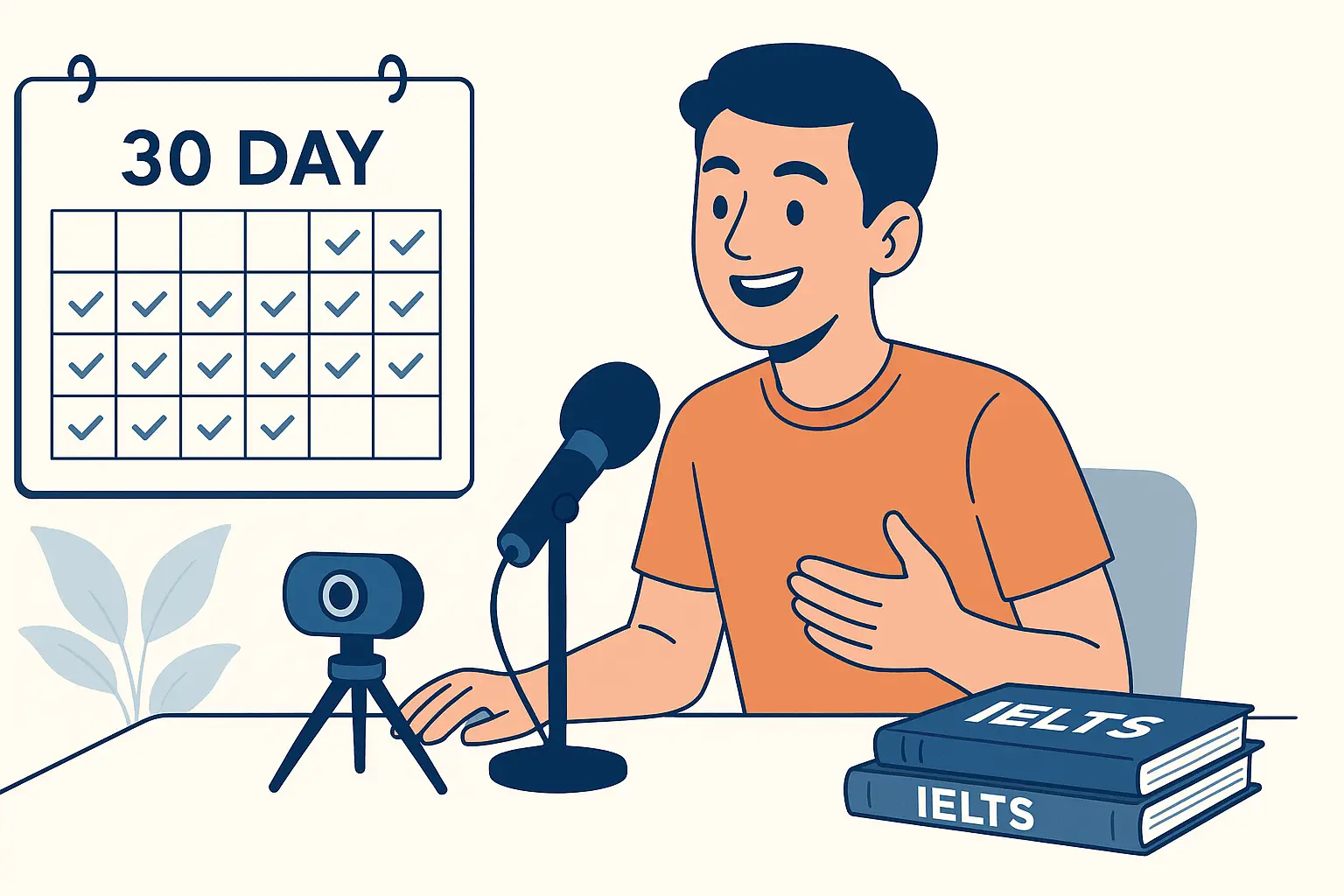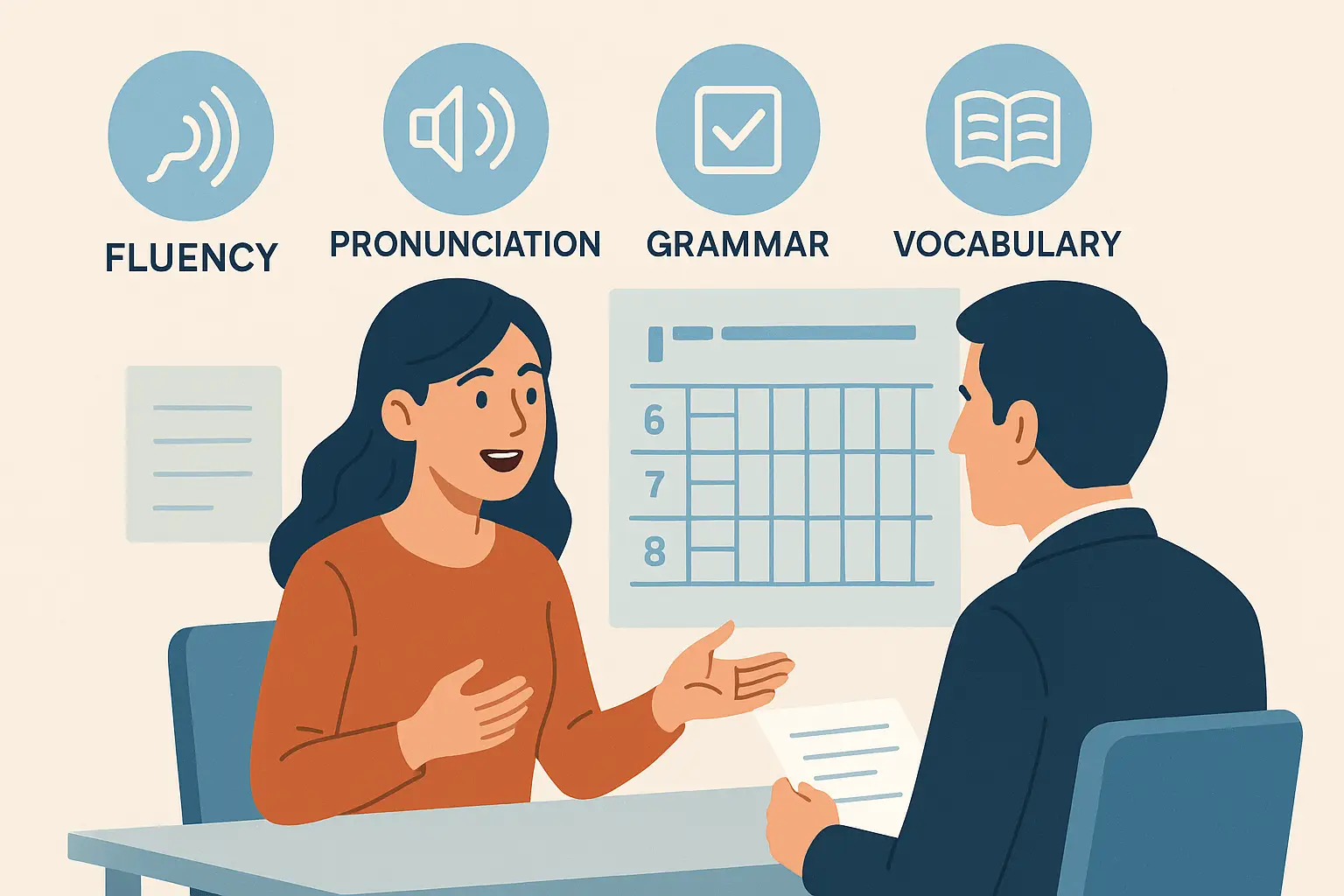“My grammar was perfect. Why didn’t I get Band 7?”
That’s the message I received from one of my students a few weeks ago — and she was genuinely confused. Her grammar was solid, vocabulary varied, and there weren’t any major mistakes. So why did she still get a 6.5?
It’s a common frustration, and I’ve seen it too many times over the past decade. The truth is, IELTS Speaking isn’t scored on what feels fluent — it’s scored on what the examiner hears and how that fits into the official marking criteria.
I’ve spent more than 10 years coaching IELTS candidates across the UK, Bangladesh, India, Canada, and beyond. And I can confidently say: most students never see the full picture until someone breaks it down clearly.
That’s exactly what this blog does. It’s my personal guide to the IELTS Speaking Band Descriptors — stripped of jargon, full of examples, and written for real students who want to understand how scoring really works.
What This Blog Will Cover
Before we dive into each scoring category, here’s a quick overview of what you’ll take away from this guide:
- ✅ A plain-English explanation of what the IELTS Speaking Band Descriptors are
- ✅ A breakdown of the four scoring criteria — Fluency, Vocabulary, Grammar, and Pronunciation
- ✅ Clear examples showing the difference between Band 6, Band 7, and Band 8 responses
- ✅ Common student mistakes (and how examiners interpret them)
- ✅ A self-assessment activity you can try today
- ✅ Real feedback from actual students and tutors I’ve worked with
If your score is stuck at 6 or 6.5, this blog might just be the key to pushing you up to that Band 7 or 8.
👉 Also read: IELTS Speaking Topics 2025 with Model Answers
🔍 What Are the IELTS Speaking Band Descriptors?
If you’ve ever finished your IELTS Speaking test wondering, “What exactly were they judging me on?” — this section is for you.
The IELTS Speaking Band Descriptors are the official marking guidelines used by examiners to score your performance. They’re not secrets — but very few students ever see them clearly explained.
You’re marked in four key areas, and each one is worth 25% of your total score:
- Fluency and Coherence – how naturally and logically you speak
- Lexical Resource – how wide and appropriate your vocabulary is
- Grammatical Range and Accuracy – how many types of sentences you use, and how correctly
- Pronunciation – how clear and natural you sound
Each of these is scored from Band 0 to Band 9, and your final Speaking Band is the average of all four.
Now, let’s go deeper into each one — just like I do when coaching my students — with examples, examiner logic, and what you can do to improve.
🗣️ Fluency and Coherence
What It Means
This is all about how smoothly you speak. The examiner wants to hear that:
- You can speak without unnatural long pauses or hesitation
- Your ideas flow in a logical, connected way
- You use linking phrases to make your answer feel like a real conversation
Band 6 vs Band 7 Example
- Band 6: “Yes, I like… um… reading… because… it is good for… um… relaxing.”
- Band 7: “Yes, I enjoy reading in the evenings — especially mystery novels. They help me unwind after a busy day.”
The Band 6 speaker struggles to keep going and loses the listener’s attention. The Band 7 speaker sounds confident, uses specific details, and links ideas smoothly.
Common Mistakes
- Pausing too often while searching for words
- Using fillers like “and… and… and…” without real connections
- Jumping between unrelated ideas without transition
Tip
Practice giving 30 to 60 second answers to common Part 1 questions. Focus on using simple connectors like:
- “For example…”
- “To be honest…”
- “On the one hand…” / “On the other hand…”
Record yourself, listen back, and check — did your ideas flow like a conversation or feel like a list? Practice short, structured answers. Use linking phrases like “for example,” “to be honest,” “on the other hand” to guide your thoughts.
💬 Lexical Resource (Vocabulary)
What It Means
This is all about the words you choose — and how well they match the context. The examiner is listening to see:
- Do you have a wide enough vocabulary to talk about everyday and unfamiliar topics?
- Do you repeat the same basic words, or can you vary your language?
- Are your word choices accurate and natural?
Band 6 vs Band 7 Example
- Band 6: “I like food. It is nice.”
- Band 7: “I enjoy trying different kinds of street food, especially spicy snacks like samosas or tacos.”
Notice how the Band 7 response is more specific, more colourful, and gives a clearer picture.
Common Mistakes
- Choosing words just to “sound smart” — and using them awkwardly
- Saying “good,” “nice,” or “bad” too often
- Avoiding descriptive or topic-specific terms because you’re unsure
Tip
Study vocabulary by topic, not by alphabet. Start with common IELTS themes like:
- Health and Fitness
- Travel and Holidays
- Technology and Social Media
- Environment and Sustainability
Use flashcard apps like Anki or Quizlet to learn new phrases — not just single words. And try speaking them in a sentence to test how natural they sound.
👉 Explore more: IELTS Speaking Vocabulary for Band 7+
🧱 Grammatical Range and Accuracy
What It Means
This criterion is about how flexible and accurate your grammar is when speaking. The examiner is listening for:
- A variety of sentence structures — simple, compound, and complex
- Consistent use of the correct tense (past, present, future)
- Minimal grammar mistakes that don’t affect clarity
Band 6 vs Band 7 Example
- Band 6: “Yesterday I go to the mall. It is fun.”
- Band 7: “Yesterday, I went to the mall with my cousin. We hadn’t seen each other in weeks, so it was great to catch up.”
The Band 6 version has basic errors in verb tense. The Band 7 version not only uses past and past perfect correctly, but also adds more detail and structure.
Common Mistakes
- Mixing up verb tenses (e.g., using present for past)
- Avoiding more complex sentence structures out of fear
- Small errors in articles (a/the), plurals, and prepositions
Tip
Grammar improvement starts with awareness. Instead of memorising rules, try this:
- Record your answer to a speaking question
- Write out your transcript
- Highlight every verb and check its tense
- Rewrite the sentence using a different structure (add “although,” “because,” or a relative clause)
This process builds grammar while practising speaking — exactly how real progress happens.
👉 Learn more: Grammar for IELTS Speaking
🔊 Pronunciation
What It Means
This is all about how easy it is to understand you — not whether you sound British or American. The examiner listens for:
- Clear pronunciation of everyday and topic-specific words
- Natural intonation and word stress
- Whether your accent makes communication difficult (it usually doesn’t — unless it’s extreme)
Band 6 vs Band 7 Example
- Band 6: Flat tone, monotone delivery, unclear stress on key words
- Band 7: Natural rhythm and sentence music, emphasis on important ideas
The Band 6 speaker may sound robotic or hard to follow. The Band 7 speaker sounds like someone having a natural conversation.
Common Mistakes
- Speaking too fast or mumbling
- Using the same pitch for every word
- Mispronouncing key IELTS topic words (e.g., “environment,” “technology,” “education”)
Tip
Try shadowing — listen to a short audio clip from a podcast or video, then repeat what you hear exactly the way the speaker says it. Match the tone, pause, and emotion.
🎧 Bonus Practice: Record yourself answering a question. Then play it back at 0.75x speed. Do you sound smooth or mechanical? Which words are too fast or unclear?
This is one of the fastest ways to improve how you sound to an examiner — without changing your accent.
🎯 Practice: Score Yourself
Let’s put everything you’ve learned into action. Choose one IELTS Speaking Part 2 cue card, set a timer, and speak for 90 seconds.
Then, rate yourself in each of the four scoring categories — just like an examiner would:
- Fluency and Coherence: Did you speak naturally without long pauses? Did your ideas connect?
- Vocabulary (Lexical Resource): Did you use a mix of words, or repeat the same ones?
- Grammar: Were your sentences accurate and varied?
- Pronunciation: Would a stranger understand you easily?
🎧 Tip: Use your phone to record your answer, then listen back twice — once like a student, and once like a judge.
💬 Bonus: Ask a study partner or tutor to give you a second opinion. It often reveals things we miss ourselves.
👉 Need cue cards? Try: IELTS Speaking Cue Card Practice
💡 Final Takeaway: How to Truly Impress an Examiner
You don’t need a perfect British accent or fancy vocabulary to impress an examiner — you need to sound like someone who uses English naturally, every day.
Here’s what truly makes a difference:
- ✅ Speak clearly, even if you pause sometimes
- ✅ Use topic-appropriate vocabulary, not memorised templates
- ✅ Mix short and complex sentences for variety
- ✅ Add natural tone and emotion — like a real conversation
If your score has been stuck for a while, chances are one of the four areas above is pulling you down. Now that you understand the descriptors clearly, you can start fixing your weak spots with purpose.
📌 Bookmark this guide. Share it with a study buddy. And most importantly, start applying what you’ve learned today — in every answer you give.
👉 Next step: IELTS Speaking Practice Tests
🙌 You’ve got this!






3 Responses
Very interesting info!Perfect just what I was searching for!
Somebody necessarily lend a hand to make seriously articles I might state. This is the first time I frequented your website page and to this point? I surprised with the analysis you made to make this actual publish incredible. Wonderful process!